Did you know that Mount Crawford Forest is home to one of South Australia’s oldest pine plantations, with some trees dating back to the 1870s? This 12,000-hectare forest wonderland, just an hour’s drive from Adelaide, offers a perfect escape from city life with its network of hiking trails, abundant wildlife, and peaceful picnic spots nestled among towering pines and native eucalypts.
Getting There & Planning Your Journey
Mount Crawford Forest is located in the northern Mount Lofty Ranges, approximately 60 kilometers northeast of Adelaide. The forest headquarters sits near the small township of Williamstown, making it an easy day trip from South Australia’s capital city.
How to Reach Mount Crawford Forest
The most convenient way to reach Mount Crawford Forest is by car. From Adelaide, take the North Eastern Freeway (M1) toward the Barossa Valley, then follow signs to Williamstown and Mount Crawford Forest. The drive takes approximately one hour, offering scenic views of the Adelaide Hills along the way.
If you’re planning a visit, it’s advisable to check the ForestrySA website for any temporary closures or fire bans, especially during summer months. The forest may close on days of extreme fire danger, so always verify conditions before setting out.
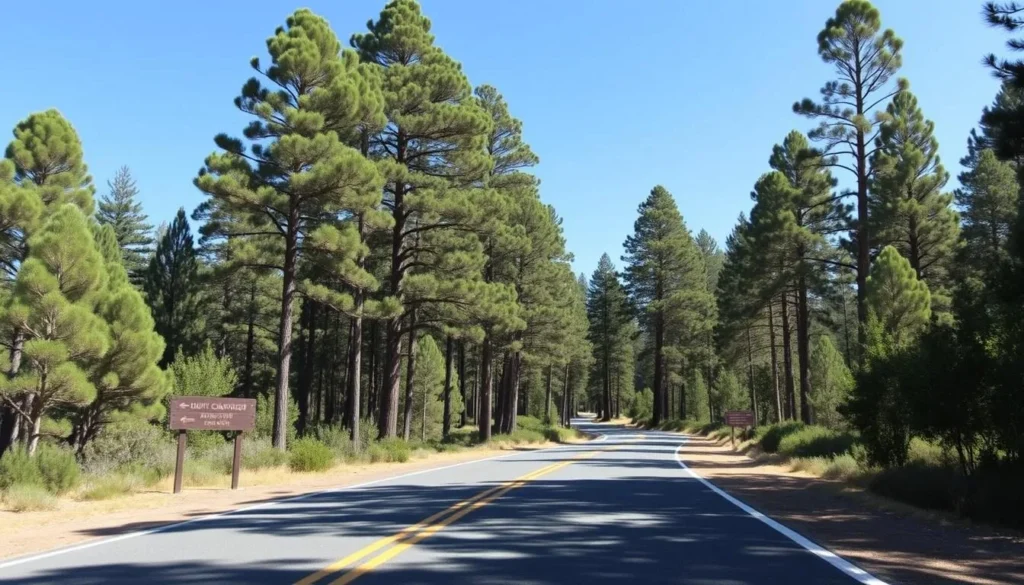
Best Time to Visit & Weather Tips
Mount Crawford Forest experiences four distinct seasons, each offering a unique experience for visitors. The region has a Mediterranean climate with warm, dry summers and cool, wet winters.
Seasonal Highlights
- Spring (September-November): Wildflowers bloom, mild temperatures (15-22°C), and perfect hiking conditions.
- Summer (December-February): Warm days (25-35°C), ideal for early morning walks and picnics in shaded areas.
- Autumn (March-May): Stunning foliage colors, comfortable temperatures (12-25°C), and fewer visitors.
- Winter (June-August): Cool and wet (5-15°C), with occasional frost and fog creating magical forest scenes.
Weather Considerations
- Summer fire bans are common – check restrictions before planning barbecues.
- Winter trails can become muddy after rain – bring appropriate footwear.
- Temperature drops significantly at night, even in summer – pack layers.
- The forest elevation means it’s typically 3-5°C cooler than Adelaide.
The most comfortable time to visit is during spring and autumn when temperatures are mild and the forest is at its most picturesque. Winter offers peaceful solitude but prepare for wet conditions, while summer requires early starts to avoid the midday heat.
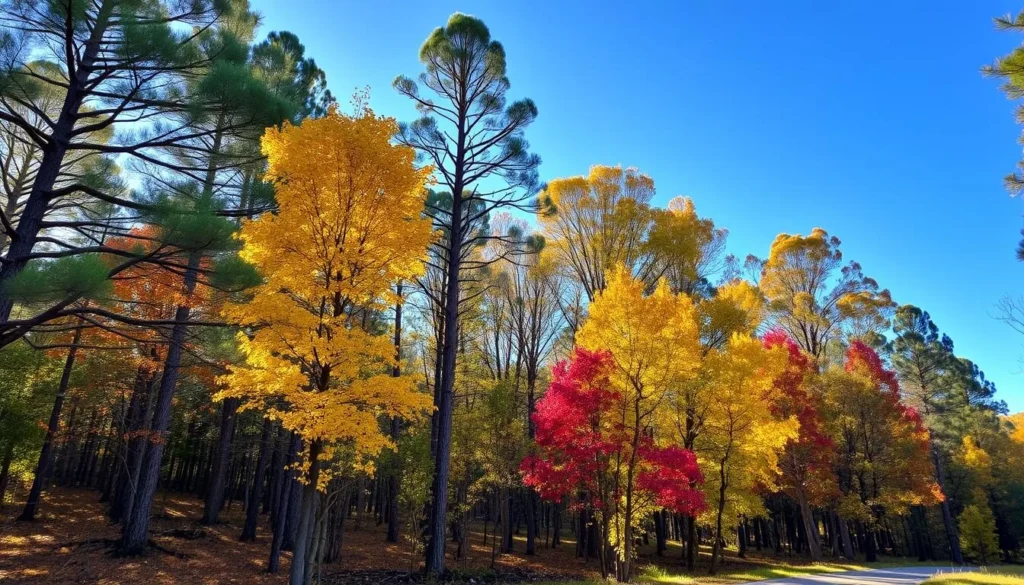
Getting Around Locally
Mount Crawford Forest covers a vast area with multiple access points and recreation zones. Having your own vehicle is essential for exploring the forest thoroughly, as there’s no public transportation within the forest boundaries.
Forest Roads and Access
The forest features a network of well-maintained gravel roads that are generally suitable for standard vehicles. However, after heavy rain, some tracks may become slippery or temporarily inaccessible. Four-wheel drive vehicles are recommended for exploring more remote areas, especially during winter months.
Main forest access points include:
- Mount Crawford Forest Headquarters (visitor information available)
- Crag Road entrance (near Williamstown)
- Warren Road entrance (eastern side)
- Watts Gully Road (northern section)
Maps are available at the Forest Headquarters or can be downloaded from the ForestrySA website before your visit. Cell phone coverage can be patchy in some areas of the forest, so it’s advisable to download offline maps or bring a physical map for navigation.
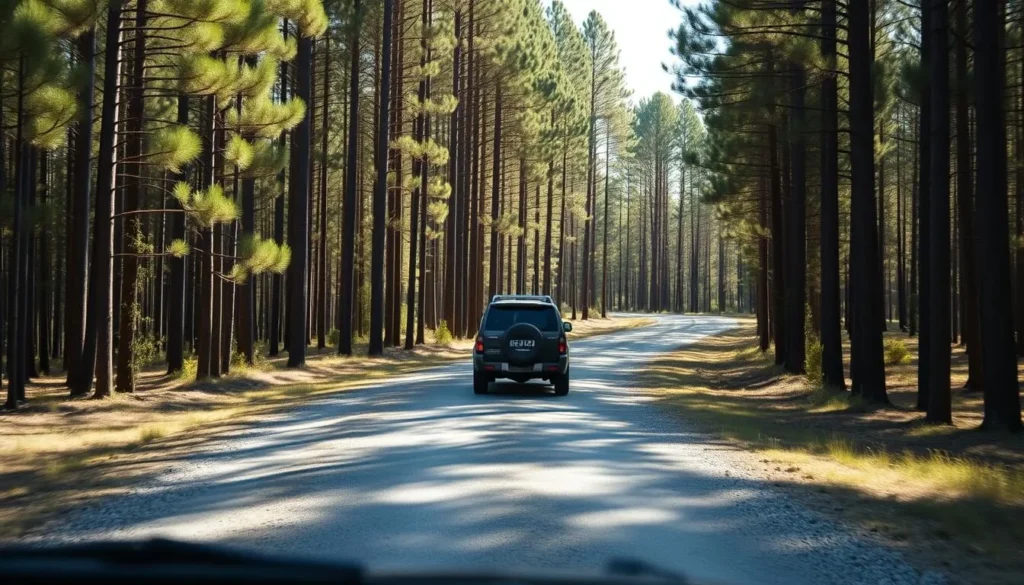
Where to Stay
While camping is not permitted within Mount Crawford Forest itself, several accommodation options are available in the surrounding areas, ranging from cozy bed and breakfasts to holiday homes and caravan parks.
Nearby Towns
The charming townships surrounding Mount Crawford Forest offer various accommodation options:
- Williamstown (5 minutes) – Closest town with basic amenities
- Birdwood (15 minutes) – Historic town with cafes and B&Bs
- Gumeracha (20 minutes) – Quaint village with country hospitality
- Barossa Valley (25 minutes) – Wine region with luxury options
Accommodation Types
Visitors can choose from various lodging styles to suit their preferences:
- Country cottages with forest views
- Historic homesteads converted to B&Bs
- Self-contained holiday homes
- Caravan parks with cabin options
- Farmstays offering authentic rural experiences
Camping Options
While camping isn’t allowed in the forest proper, nearby options include:
- Warren Reservoir Reserve (basic facilities)
- Barossa Tourist Park (full amenities)
- Chain of Ponds (seasonal camping)
- Private properties offering farm camping
For the best experience, consider staying in one of the small towns within a 20-minute drive of the forest. This provides easy access for early morning or late afternoon visits when wildlife is most active and lighting is perfect for photography.
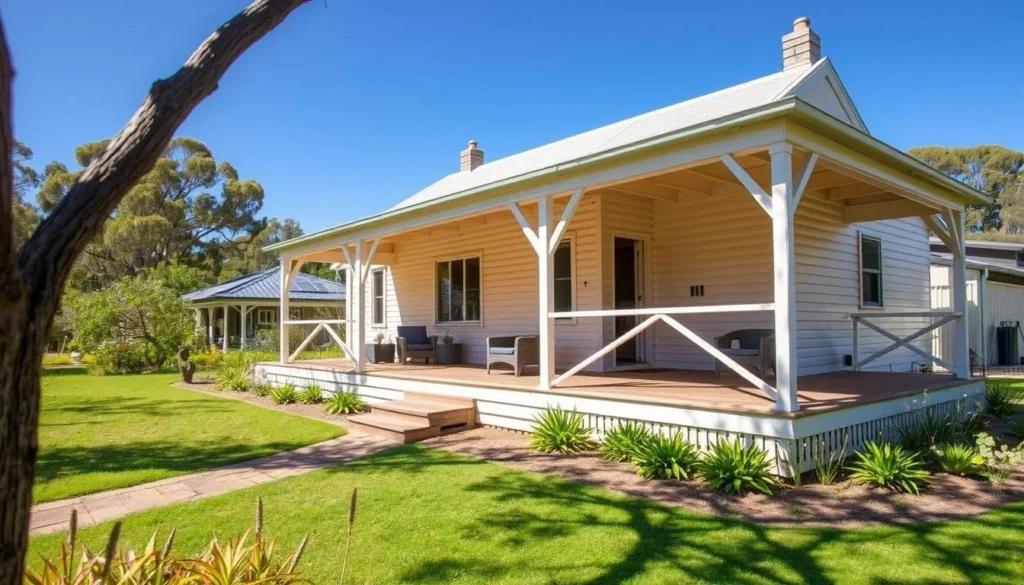
Dining & Local Cuisine
The area surrounding Mount Crawford Forest offers a delightful range of dining options, from country bakeries to award-winning restaurants in the nearby Barossa Valley wine region.
Picnicking in the Forest
One of the most popular dining experiences is bringing your own provisions and enjoying a picnic within the forest itself. Several designated picnic areas feature tables, shelters, and BBQ facilities (subject to fire restrictions):
- Rocky Paddock Picnic Area – Spacious with good facilities
- Chalk’s Campground – Historic site with large tables
- Pewsey Vale Picnic Area – Scenic views of surrounding hills
Local Eateries
The surrounding towns offer charming cafes and restaurants serving hearty country fare:
Williamstown & Birdwood
- Williamstown Bakery – Famous for traditional Australian pies and pastries
- Jack Rabbit’s Cafe – Casual dining with local produce
- Blumberg Hotel – Classic pub meals in historic setting
Barossa Valley
- Maggie Beer’s Farm Shop – Iconic Australian cuisine
- Harvest Kitchen – Shared plates featuring regional produce
- Vintners Bar & Grill – Fine dining with extensive wine list
Don’t miss the opportunity to sample local specialties including Barossa Valley cheese, mettwurst (German-style sausage), and honey from local apiaries. Many establishments proudly serve produce grown in the fertile soils surrounding Mount Crawford.
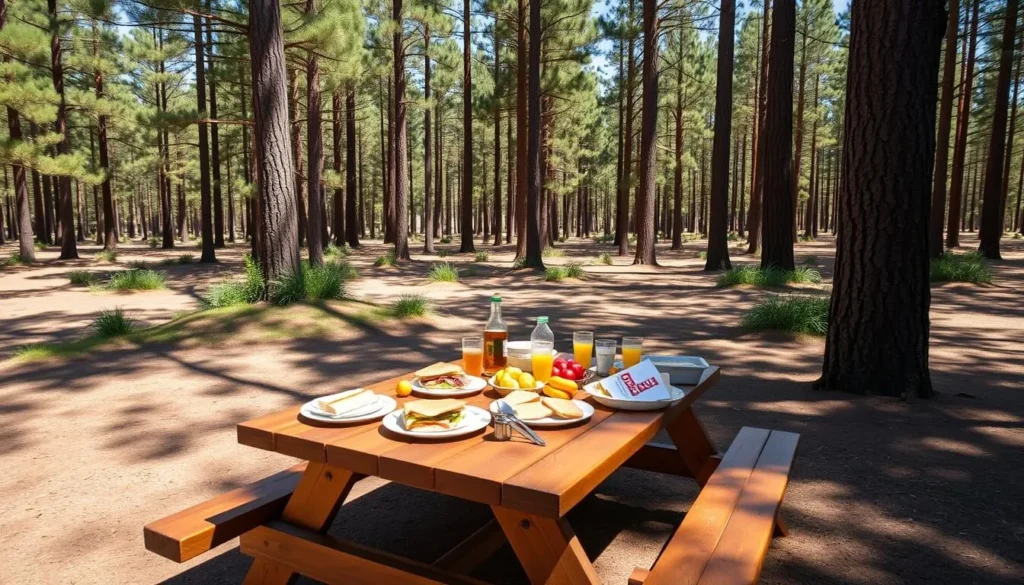
Attractions, Sightseeing & Activities
Mount Crawford Forest offers a diverse range of activities for nature lovers, outdoor enthusiasts, and families seeking a peaceful retreat from urban life.
Hiking Trails
The forest boasts an extensive network of walking trails suitable for all fitness levels:
Easy Walks
- Jenkins Scrub Walking Trail (1.5km, 1hr) – Perfect for families
- Mount Crawford Loop (6km, 1.5hrs) – Gentle terrain with forest views
- Hale Conservation Park Loop (4km, 1hr) – Wildlife spotting opportunities
Moderate Hikes
- Morgan Loop Trail (6.8km, 2.5hrs) – Varied terrain and vegetation
- Anderson Loop Trail (8.4km, 3hrs) – Scenic ridgeline views
- Hiking Loop from Williamstown (9.2km, 2.5hrs) – Forest immersion
Challenging Routes
- Mount Pleasant Summit Trail (11.5km, 4.5hrs) – Rewarding panoramas
- Heysen Trail Loop (13km, 7hrs) – Part of the famous long-distance trail
- Simpson Loop Trail (19.5km, 6hrs) – Full-day adventure
Other Activities
- Mountain biking on designated forest trails
- Bird watching (over 50 species including rosellas, kookaburras, and wedge-tailed eagles)
- Photography, especially during golden hour lighting
- Seasonal mushroom foraging (with proper knowledge)
- Horse riding on designated bridle trails (BYO horse)
During spring, wildflower enthusiasts will be rewarded with displays of native orchids, wattles, and other indigenous flora. The forest is also home to a variety of wildlife including kangaroos, koalas, echidnas, and numerous bird species.
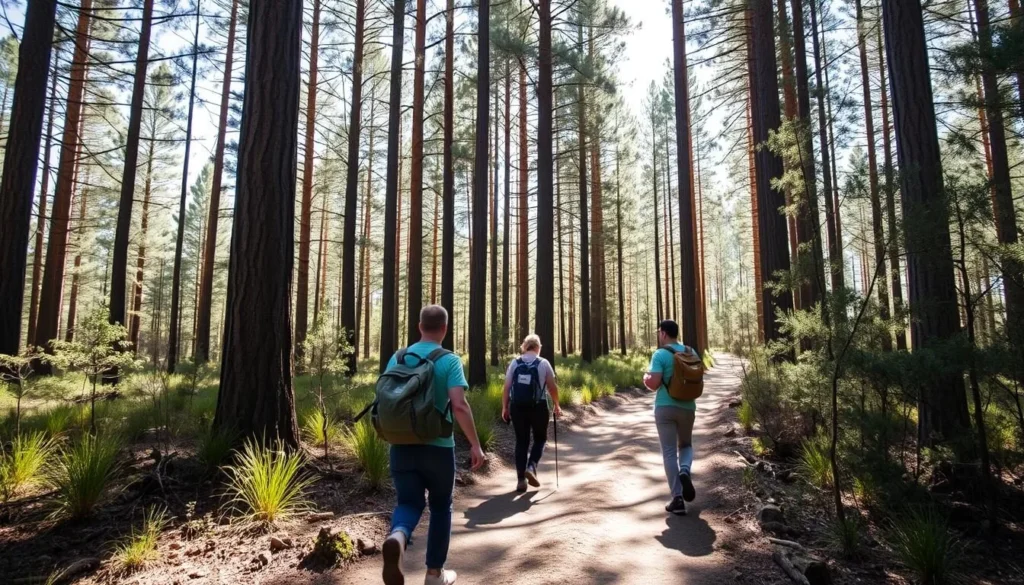
Cultural Significance & History
Mount Crawford Forest carries a rich tapestry of cultural and historical significance, from its Indigenous heritage to its role in South Australia’s forestry development.
Indigenous Connection
The traditional custodians of the Mount Crawford area are the Peramangk people, who called the mount “Teetáka.” The surrounding landscape held important cultural significance, with evidence of their presence dating back thousands of years. The forest and adjacent areas provided abundant resources including food, medicine, and materials for tools and shelter.
European Settlement
European history in the area began in 1839 when explorer Charles Sturt named Mount Crawford after James Coutts Crawford, who established a cattle run at the base of the mount. The subsequent decades saw pioneer families including the Colemans, Hammats, and Warrens establishing pastoral activities in the region.
An interesting chapter in the area’s history was the alluvial gold rush in the late 19th century. While not as famous as other Australian gold fields, fossicking still occasionally takes place in the area today.
Forestry Heritage
The forest as we know it today began taking shape in the 1870s with some of South Australia’s earliest pine plantations. Mount Crawford Forest became a crucial resource for timber production, particularly during the state’s development and expansion phases. Today, it represents a balance between sustainable forestry, conservation, and recreation.
Throughout the forest, visitors can spot remnants of old forestry operations, historic buildings, and interpretive signs that tell the story of this working landscape.
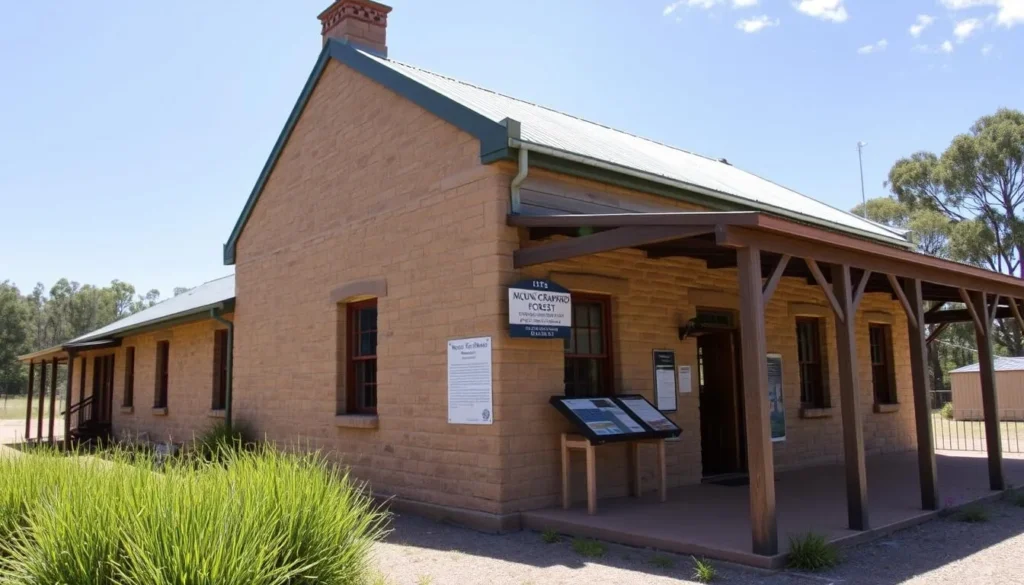
Wildlife & Natural Features
Mount Crawford Forest hosts a fascinating diversity of wildlife and natural features that make it a paradise for nature enthusiasts and photographers alike.
Native Animals
The forest provides habitat for numerous Australian wildlife species. Early morning or late afternoon visits offer the best chances for wildlife encounters:
- Western Grey Kangaroos – Often seen grazing in clearings at dawn and dusk
- Koalas – Occasionally spotted in eucalyptus trees in native forest sections
- Echidnas – Foraging along forest floors, particularly in spring and summer
- Possums and Gliders – Nocturnal residents visible during spotlight walks
- Reptiles – Including blue-tongued lizards, sleepy lizards, and occasionally eastern brown snakes
Birdwatching
The forest is a birdwatcher’s delight with over 50 species recorded:
- Crimson Rosellas and Adelaide Rosellas – Adding splashes of color among the trees
- Laughing Kookaburras – Their distinctive call echoes through the forest
- Wedge-tailed Eagles – Australia’s largest bird of prey soars above the canopy
- Yellow-tailed Black Cockatoos – Often seen in small, noisy groups
- Superb Fairy-wrens – Tiny blue jewels flitting through undergrowth
Plant Life
While predominantly a commercial pine plantation, Mount Crawford Forest also contains significant areas of native vegetation:
- Radiata Pine – The predominant plantation species
- Eucalyptus (gum trees) – Including blue gum and river red gum in native sections
- Native understory plants – Wattles, native grasses, and seasonal wildflowers
- Orchids – Several species bloom in spring in protected areas
The contrast between plantation areas and remnant native vegetation creates interesting ecological boundaries worth exploring.
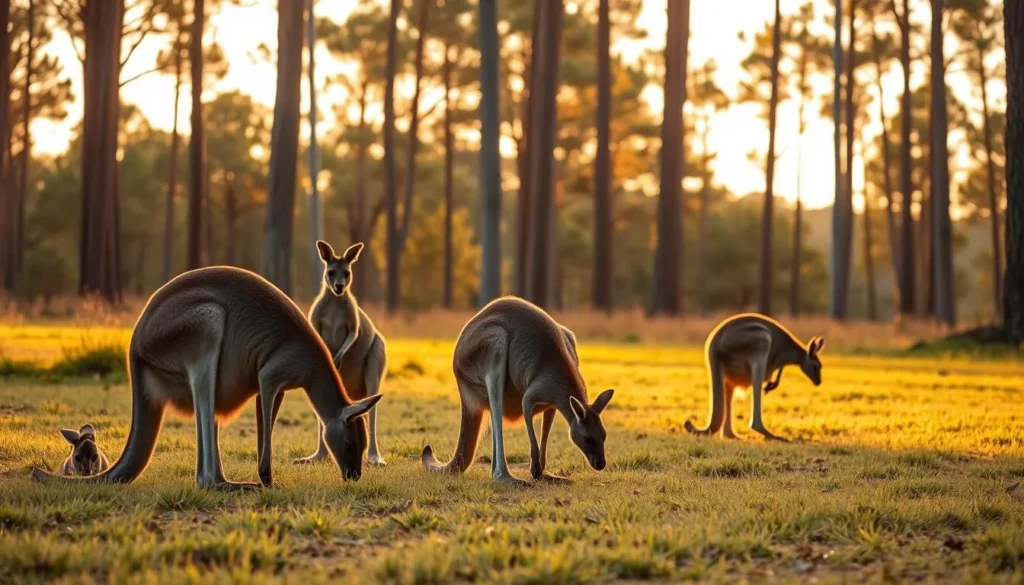
Practical Travel Tips
Make the most of your visit to Mount Crawford Forest with these essential tips and guidelines.
Forest Regulations
- Entry fees: None for day visitors (as of 2024)
- Opening hours: Generally open daily from sunrise to sunset
- Permits: Required for organized group activities (contact ForestrySA)
- Fire restrictions: Strictly enforced, especially during summer
- Dogs: Allowed on leash in most areas
Safety Considerations
Mount Crawford Forest is a working forest with active logging operations. Always respect closed areas and watch for forestry vehicles on roads.
- Carry sufficient water, especially in summer (no drinking water available)
- Check weather forecasts before visiting (avoid during extreme weather)
- Inform someone of your plans if hiking on longer trails
- Be aware of wildlife – keep distance from snakes and large kangaroos
- Cell phone coverage can be patchy – download offline maps
What to Bring
- Sturdy footwear suitable for uneven terrain
- Sun protection (hat, sunscreen, sunglasses)
- Insect repellent, particularly in warmer months
- Drinking water and snacks
- Camera for wildlife and landscape photography
- Binoculars for birdwatching
For the most up-to-date information about forest conditions, temporary closures, or special events, check the ForestrySA website before your visit or contact the Mount Crawford Forest Headquarters.
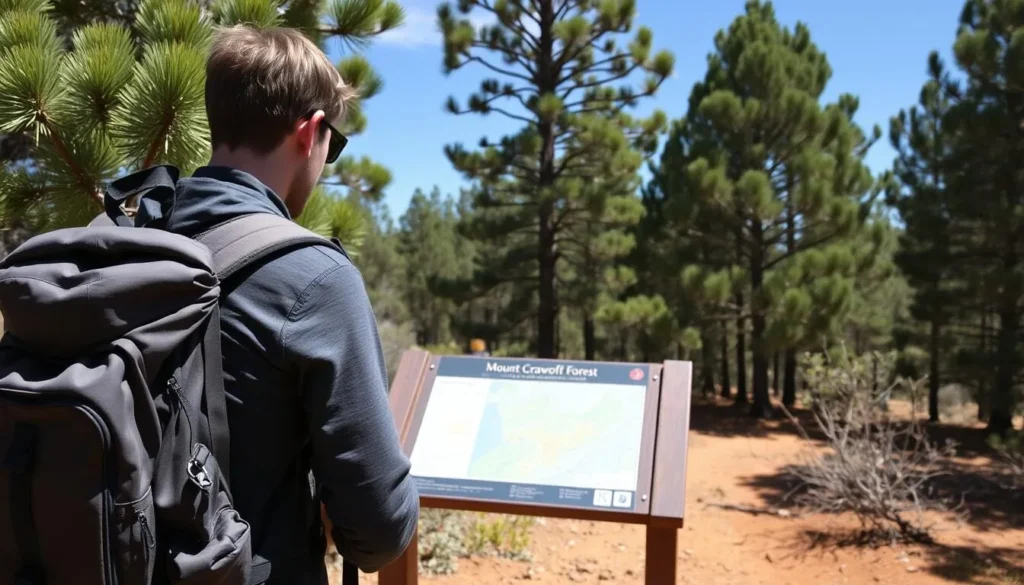
Nearby Attractions
While Mount Crawford Forest offers plenty to explore, the surrounding region boasts additional attractions worth including in your itinerary.
Barossa Valley
Just 20 minutes north of the forest lies Australia’s premier wine region:
- World-class wineries offering tastings and cellar door experiences
- Artisanal food producers including cheese makers and smokehouses
- Maggie Beer’s Farm Shop – iconic Australian culinary destination
- Scenic drives through vineyard-covered landscapes
Adelaide Hills Towns
Charming historic villages dot the surrounding Adelaide Hills:
- Birdwood – Home to the National Motor Museum
- Gumeracha – Features the “Big Rocking Horse” and toy factory
- Hahndorf – Australia’s oldest surviving German settlement
- Lobethal – Known for its Christmas lights and craft breweries
Natural Attractions
Other natural areas complement your forest experience:
- Warren Reservoir – Fishing and non-powered boating
- South Para Reservoir – Scenic walking trails
- Hale Conservation Park – Native bushland with wildlife
- Mount Pleasant Summit – Panoramic views of the region
Most of these attractions are within a 30-minute drive of Mount Crawford Forest, making it easy to combine several experiences in a single day or to extend your stay in the region for a more comprehensive exploration.
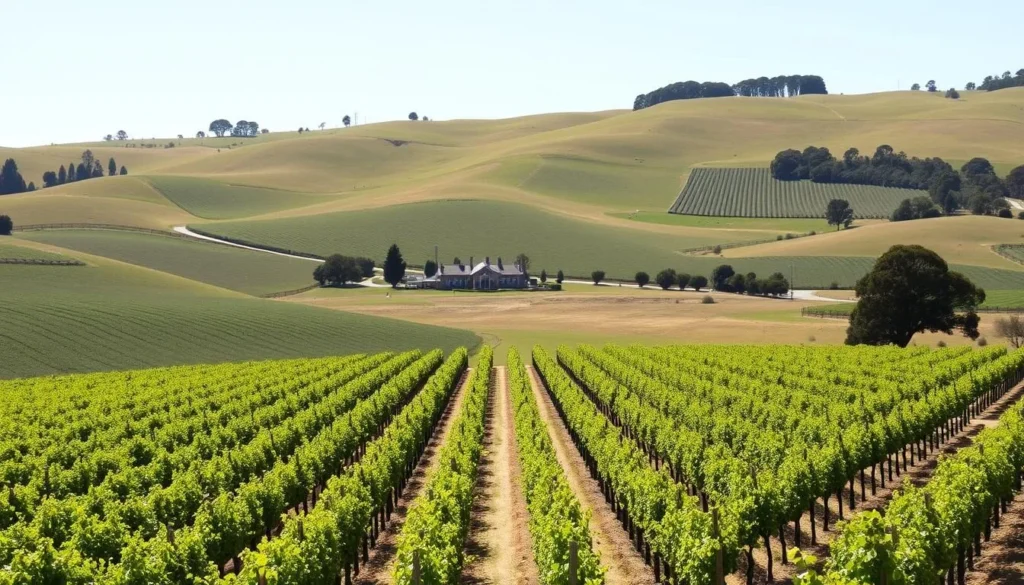
Conclusion
Mount Crawford Forest offers a perfect blend of natural beauty, outdoor recreation, and cultural heritage just an hour from Adelaide. Whether you’re seeking a peaceful picnic spot, challenging hiking trails, or wildlife encounters, this diverse forest landscape delivers memorable experiences for visitors of all ages and interests.
From the towering pines to the pockets of native bushland, from the historic sites to the modern forestry operations, Mount Crawford Forest represents South Australia’s connection to the land – past, present, and future. Pack your walking shoes, bring your camera, and prepare to discover one of the Adelaide region’s most accessible natural treasures.
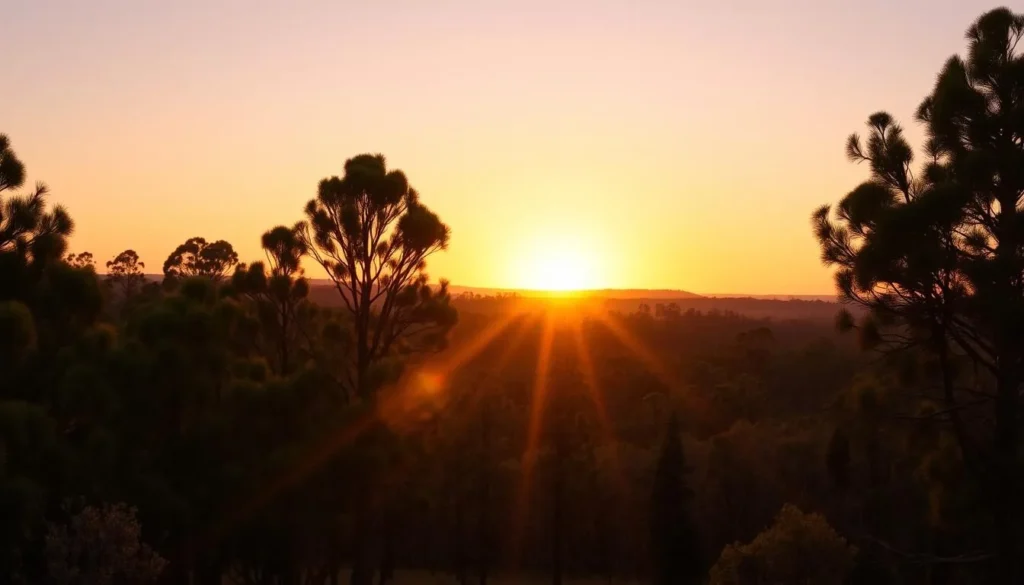
The above is subject to change.
Check back often to TRAVEL.COM for the latest travel tips and deals.
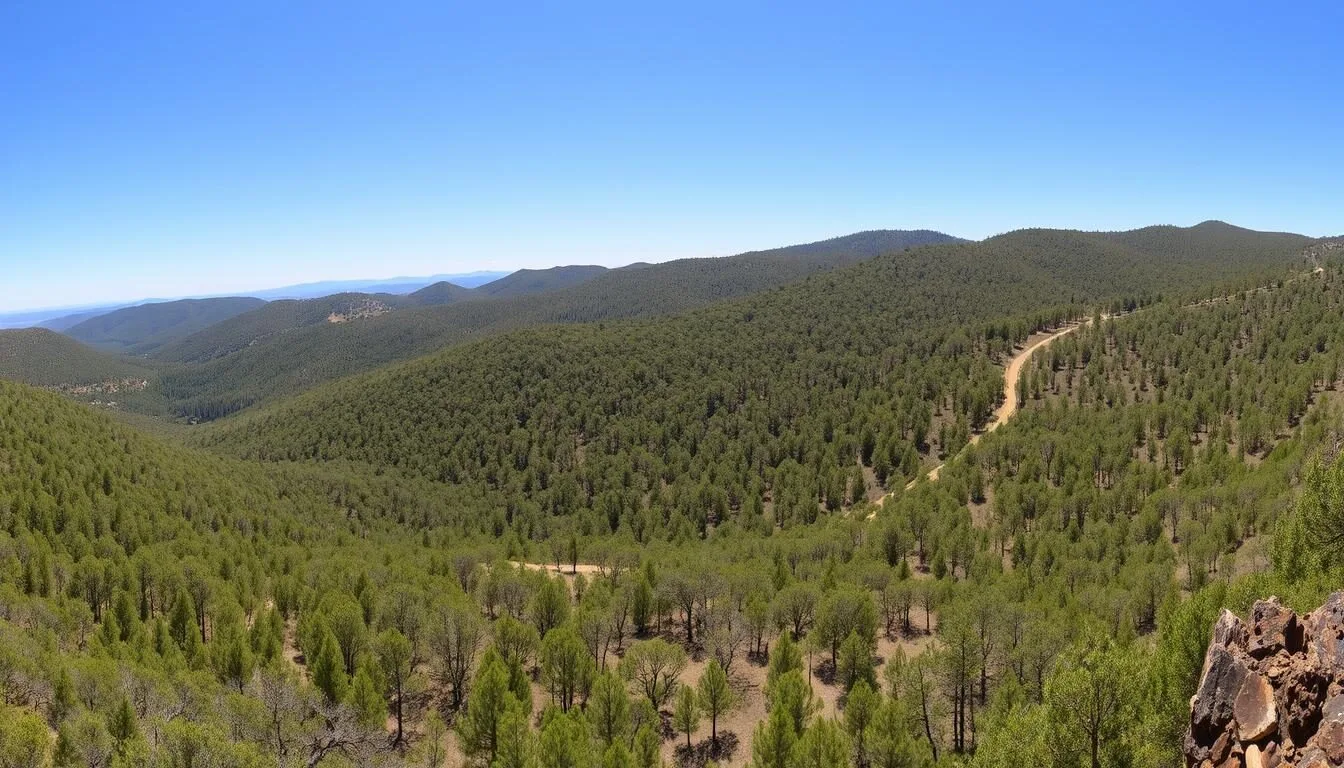
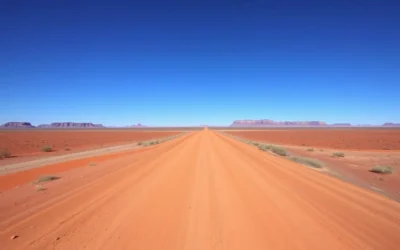
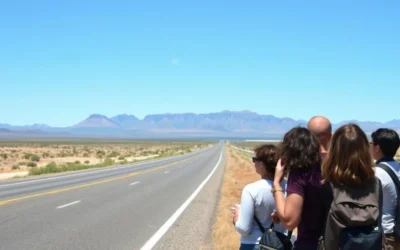

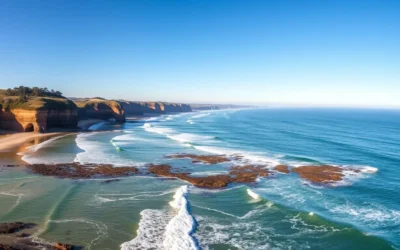
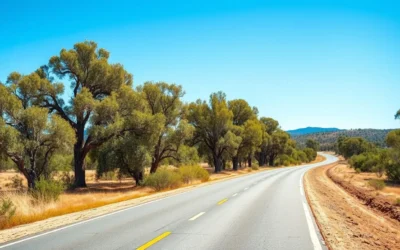
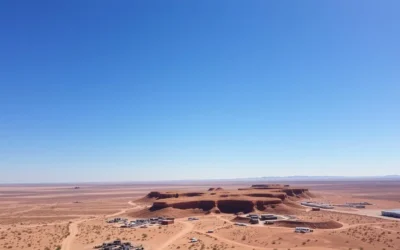
0 Comments